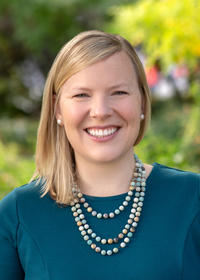I went to law school directly from work as an intake and mental health specialist at a residential treatment center for people with eating disorders. My personal and observed experience aligned with what data shows happens within the first year of law school: students undergo substantial increases in stress, anxiety, and depression. As I started to build relationships, I noticed that each of us began to rely on our default settings of coping — whatever mechanisms we had. And due to my recent training, I couldn’t help but see some of the ways that disordered eating was impacting myself and my peers. For some, that looked like overeating. For others, it showed up as overexercising or restricting food intake.
Food is a necessity in our lives. Our society, however, has some very unhealthy pressures around disordered eating and distorted views of body image. It would make sense that a group of people facing heightened stress levels would find themselves in food-related challenges as a way to cope.
What I know now is that eating disorders affect the legal profession disproportionately. A survey of law students in 2016 found that 27% of students reported meeting criteria for disordered eating (18% of males and 34% of females). Unfortunately, less than 3% reported having an actual diagnosis, indicating the difficulties students face in reaching out for help.
Recently, February 27 through March 5 was eating disorder awareness week. According to the National Eating Disorder Association (NEDA), the observance strives to raise awareness about and combat this rising trend. The Association of Anorexia Nervosa and Associated Disorders (ANAD) notes that eating disorders touch 9% of the U.S. population and an estimated 28.8 million Americans in their lifetime. These disorders have devastating consequences for people and families, with the second highest mortality rate among psychiatric problems, second only to opioid overdose.
Contrary to popular belief, eating disorders afflict “all demographics of all ethnicities at similar rates” according to NEDA. People of color, however, are less likely to be asked about symptoms by a physician, and half as likely to receive treatment. In addition, men represent approximately one-third of all cases, but are less likely to seek help.
To help illustrate the influence of American cultural and social factors, another article shares Harvard Medical School results that found “in 1995, without television, girls in Fiji appeared to be free of the eating disorders common in the West...but by 1998, after just a few years of sexy soap operas and seductive commercials, 11.3 percent of adolescent girls reported they at least once had purged to lose weight.” That research, like most of the research on the subject, does not account for the underreporting that often occurs. The Harvard study also did not capture other types of disordered eating, such as anorexia or restrictive eating, that could raise the numbers even higher.
Despite the alarming statistics, Professor and researcher Cheri Levinson notes that just 20% of people with eating disorders receive treatment. When we look at law students and lawyers, considering the high levels of pressure these groups face, including stigma, importance of reputation, and competitive culture dynamics, that figure is comparably high for attorney
populations. Barriers to care include socially accepted standards of harmful body images, disordered eating, and diet culture; lack of awareness; insufficient medical training and patient assessment; expensive and limited treatment; and a complex insurance system. Perhaps most importantly, when lawyers talk to us about eating disorders, they invariably mention that shame and stigma caused them to delay seeking help.
Given the stark health implications for physical and mental impairment, it is crucial to reach out if you’re concerned for yourself or others. You don’t need to navigate this far too prevalent but under supported area of mental health alone—specialized counselors and resources are available to help. Some of the tools within eating disorder treatment include learning intuitive eating, which entails rejecting diet mentality, honoring hunger, and honoring feelings. The National Eating Disorders Association offers a screening tool for those who are 13 and older.
Law school and legal work demand so much from us, and disordered eating can take a dramatic toll on our mental functioning. My hope is for our profession to begin to normalize seeking help for these issues. If you need assistance in accessing resources or safe, confidential support, please give us a call.
I’m grateful to my OAAP colleagues for their contributions to this post.
For More Information:
National Eating Disorders Association
Eating Disorder Hope
National Association of Anorexia Nervosa and Associated Disorders








